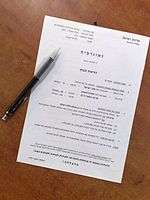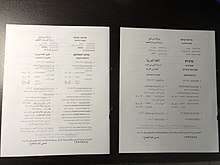Bagrut certificate
Te'udat Bagrut (Hebrew: תעודת בגרות, lit. "maturity certificate", Arabic: شهادة بجروت) is a certificate which attests that a student has successfully passed Israel's high school matriculation examination. Bagrut is a prerequisite for higher education in Israel.[1]

Overview
A Bagrut certificate is awarded by the Israeli Ministry of Education to students who pass the ministry's required written (and in some cases oral) subject-matter examinations with a passing mark (55% or higher) in each exam. The Bagrut certificate however should not be confused with a high school diploma (te'udat g'mar tichon, Hebrew: תעודת גמר תיכון، Arabic: شهادة انهاء الثانويّة), which is a certificate awarded by the Ministry of Education attesting that a student has completed 12 years of study. Bagrut scores are one of the criteria examined in applications to elite military units and Israeli academic institutions.[2] Other criteria include students' high school grades and the Psychometric Entrance Test.
Bagrut exams are frequently compared to the New York State Regents Examinations, the College Board's Advanced Placement (AP) tests, the British A-levels, the German Abitur, and the European Matura.
Bagrut exams
Bagrut examinations assess knowledge on subjects studied in high school. The process of matriculation in Israel is supervised by the country's Ministry of Education. The exams of all compulsory subjects and most elective subjects are designed and written by the Ministry, thereby creating a standard measure of the students' knowledge throughout the country. In academically oriented high schools, the last two years of studies are geared to preparing students for the bagrut exams.
Compulsory subjects

- Religious Scriptures – Tanakh, the Christian Bible, or the Qur'an, as relevant to the appropriate sector of the population
- Language
- Hebrew or Arabic grammar
- Hebrew or Arabic composition
- English language (written and oral)
- Mathematics
- Knowledge of the nation and state
- Civics and Minorities studies
- General history
- Hebrew/Arab and world literature
- At least one elective, such as geography, physics, chemistry, biology, computer science, Arabic, French, social sciences etc.
- Physical Education (only for students who studied in a traditional high-school setting, i.e., not those studying under the "external" track)
Scoring and pass rate
Most exams are available in different levels of difficulty, expressed in "units of study". In most subjects, students may choose the number of units in which they are tested. In order to receive a "full" matriculation certificate, the student must take and pass at least one subject matter exam at the 5-unit level of difficulty and earn a total of at least 21 combined study units in all bagrut exams taken. Correspondingly, the make up of a student's classes during his or her high school years is matched to the student's expected units of study they will test in their bagrut exams. So for example, a student who is planning to take the 5-unit mathematics exam will take mathematics courses specifically designed for a 5-unit level of difficulty all throughout their high school career.
65.5% of Israeli high school 2014 graduates or other individuals studying for the 2014 exam (usually post-compulsory military service persons completing Bagrut requirements later in life in order to apply for higher education) had passed the requirements to be eligible to receive a Bagrut certificate. Of the overall population who was of high school graduation age in 2019, 76.1% were eligible to receive a Bagrut certificate.[3]
Recent history
A copy of the 2010 mathematics exam (in the four and five units levels) was leaked to students, but a teacher reported it to authorities and all tests were replaced.[4]
In 2011, the percentage of 17-year-olds who passed the matriculation exams rose to 48.3 percent and the number of students sitting for the exams in both the Jewish and the Arab school systems increased.[5]
In January of 2019, the Orthodox Arab College school in Haifa received the title of best school in terms of Bagrut success rates and percentage of students who finished with a full Bagrut certificate. With 98.1% of all students being eligible for a Bagrut certificate.[6]
See also
References
- "What is Bagrut?". Archived from the original on 2014-03-05. Retrieved 2012-12-20.
- "Education in Israel". Archived from the original on 2013-06-25. Retrieved 2012-12-20.
- "Bagrut eligibility information". Israeli Ministry of Education. Archived from the original on 3 January 2016. Retrieved 28 January 2016.
- Kashti, Or (2010-05-25). "Math matriculation goes digital in Israel". Haaretz. Retrieved 4 June 2010.
- Sa'ar hails 2.2% rise in bagrut pass rate
- "The Orthodox Arab College has been chosen as the best Arab school in the country". Orthodox Arab College/ الكليّة الأرثوذسيّة العربيّة (in Arabic). Jan 24, 2019.